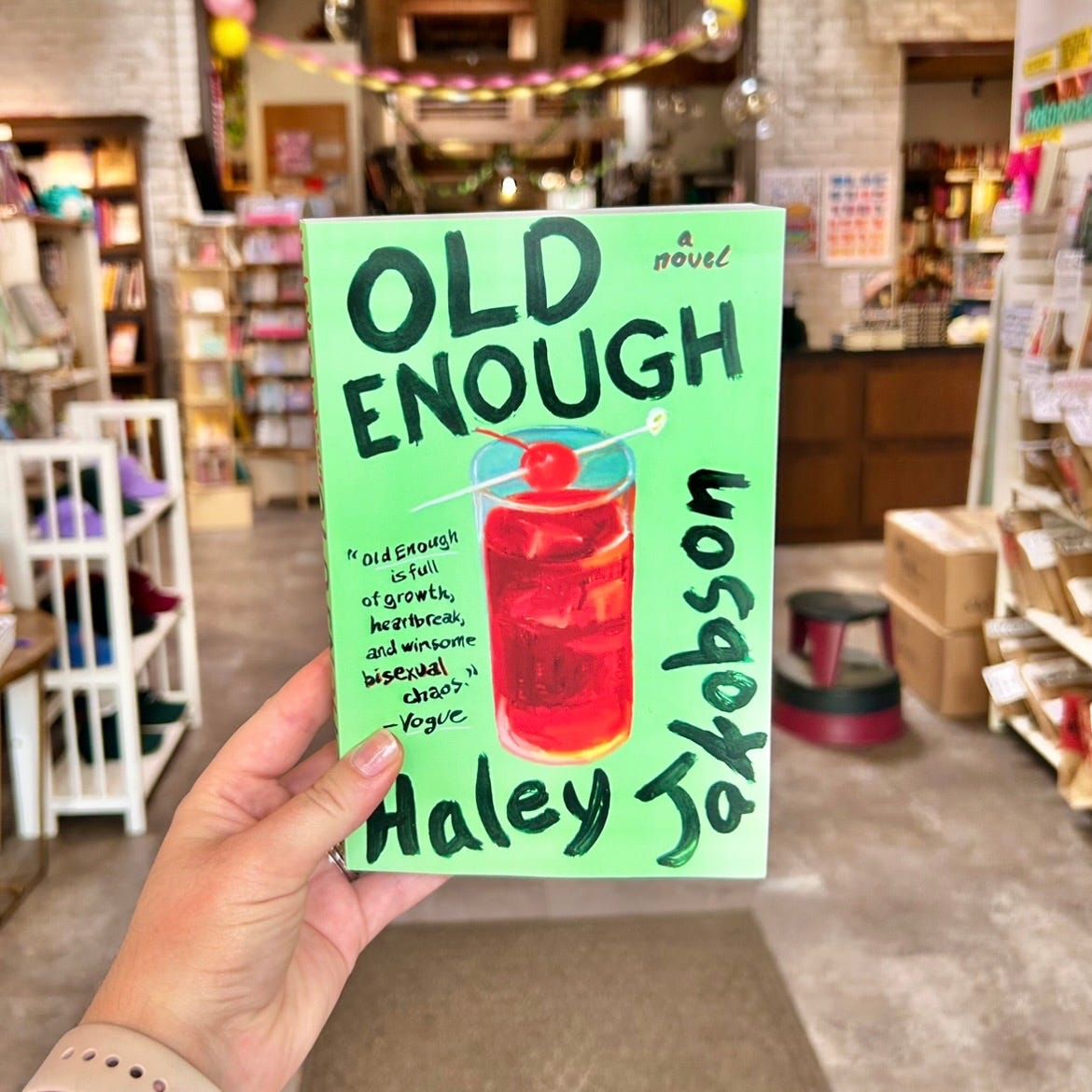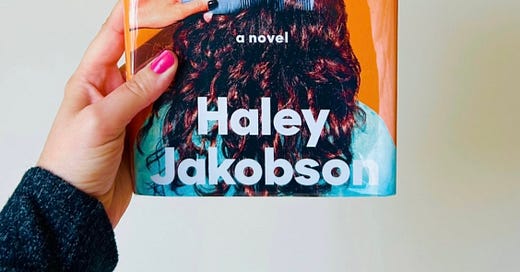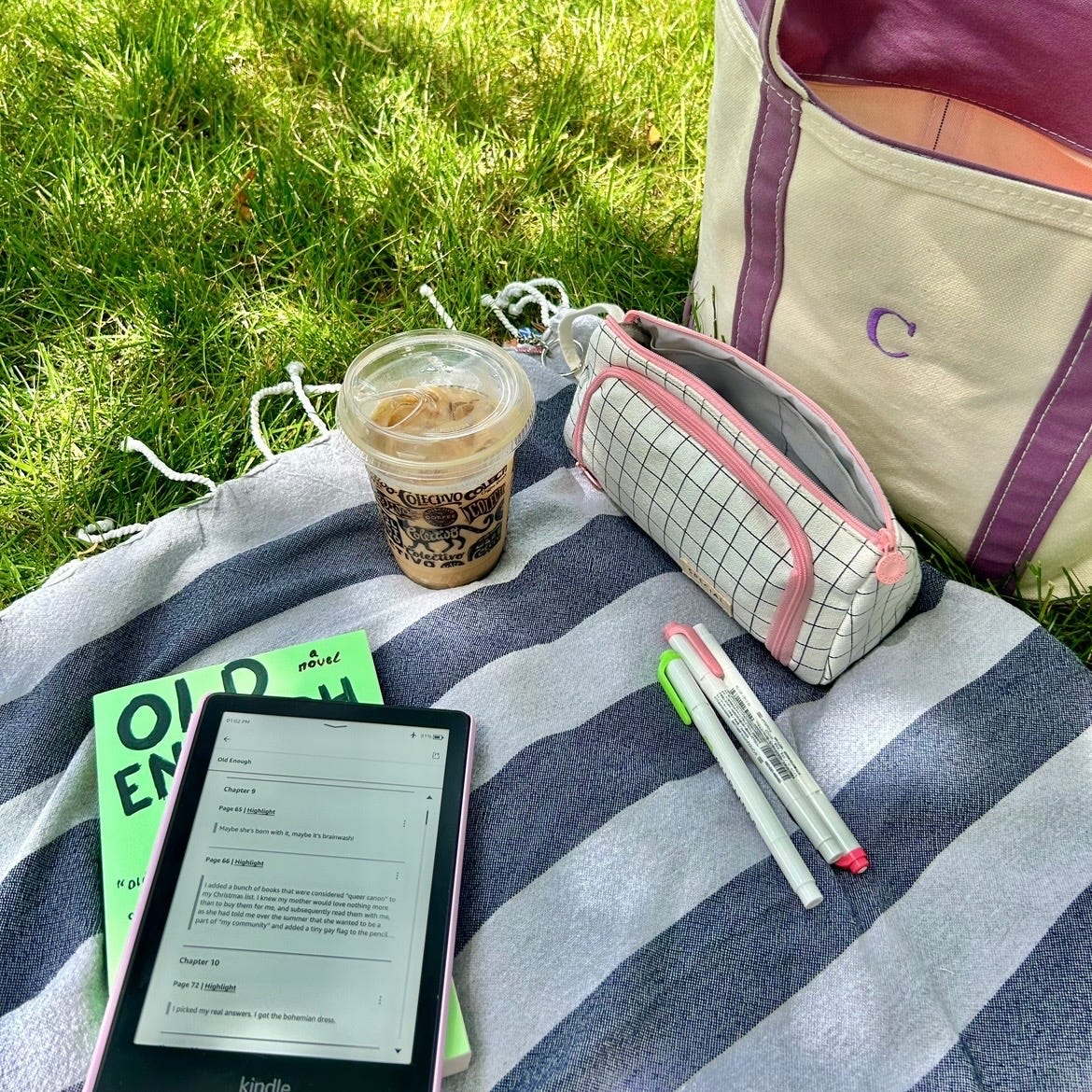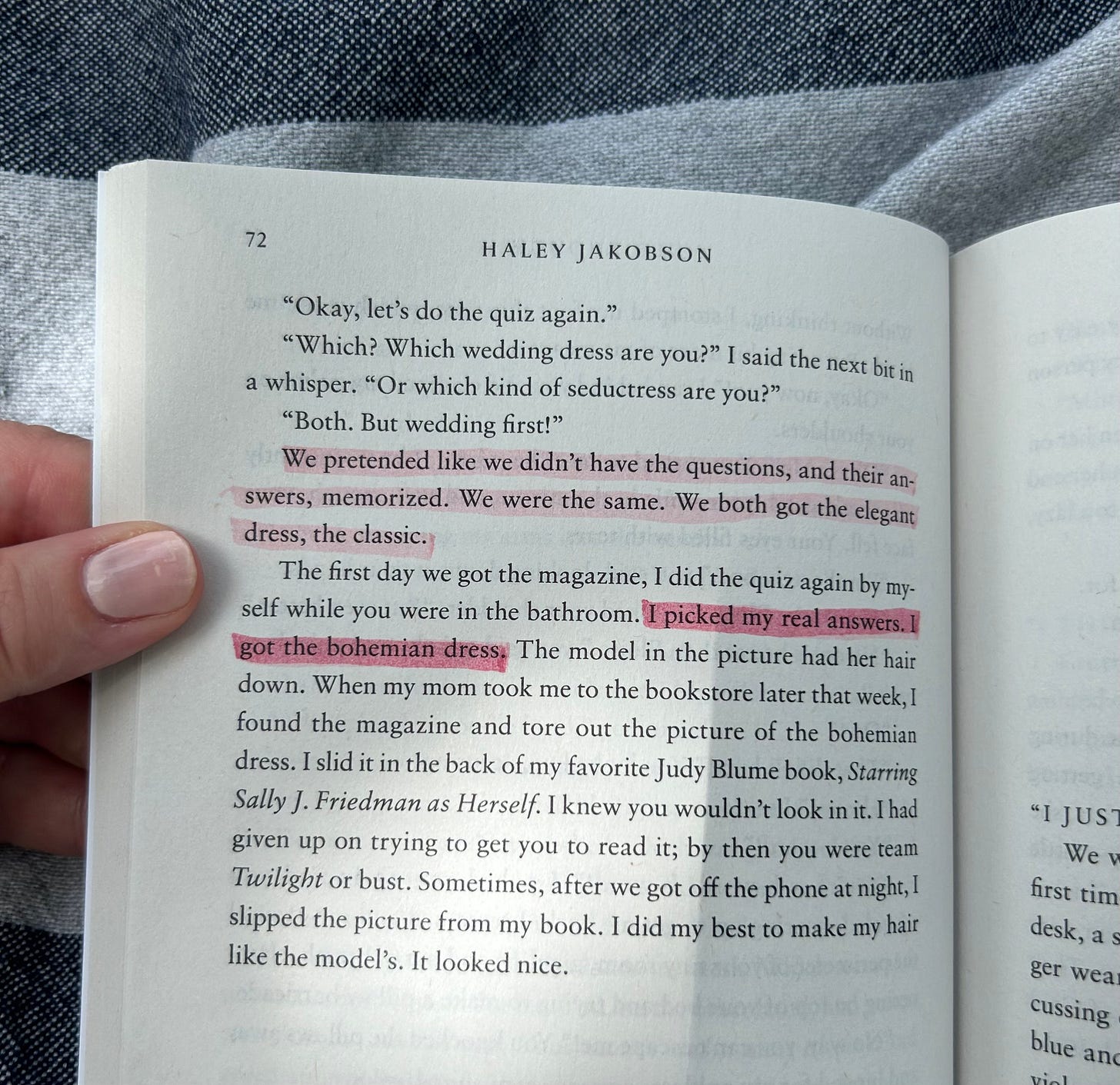
Last year’s big bisexual book of the summer—Old Enough by Haley Jakobson—is back for round two to celebrate its paperback release. Isn’t she beautiful?!
With the words on the page you’ll find queer joy, found family, changing friendships, college life, what it means to be a survivor, joyful (and awkwardly wonderful) crushes, honest mistakes, girlhood, navigating challenging conversations, and so much more.
But most importantly you’ll find the painful, beautiful reality of what it means to be human. To be flawed. To evolve. To be your true self. To love and be loved. I’ve learned to lean in and embrace feeling big feelings, and here, we’re welcome to.
So, Happy Pride and Happy Paperback Release to Old Enough. Grab a Shirley Temple and let’s discuss!
This is your warning now to save this post and come back to it later if you want to avoid any spoilers.
Disclaimers:
All thoughts are my own and this is unsponsored and not in collaboration with any publisher or company mentioned.
This contains affiliate links from Bookshop.org, where I will earn a commission from qualifying purchases (at no additional cost to you).
Please use The StoryGraph to check Content Warnings.
Background
This was published by Dutton Books, an imprint of Penguin Random House, in hardcover on June 20, 2023, and its frontlist paperback was published just shy of a year later on June 11, 2024. Its paperback is 320 pages and the audiobook is 9 hours and 40 minutes, narrated by Jenna Kay and author Haley Jakobson.
Synopses
Savannah "Sav" Henry is almost the person she wants to be, or at least she's getting closer. It's the second semester of her sophomore year. She's finally come out as bisexual, is making friends with the other queers in her dorm, and has just about recovered from her disastrous first queer "situationship." She is cautiously optimistic that her life is about to begin.
But when she learns that Izzie, her best friend from childhood, has gotten engaged, Sav faces a crisis of confidence. Things with Izzie haven't been the same since what happened between Sav and Izzie's older brother when they were sixteen. Now, with the wedding around the corner, Sav is forced to reckon with trauma she thought she could put behind her.
On top of it all, Sav can't stop thinking about Wes from her Gender Studies class—sweet, funny Wes, with their long eyelashes and green backpack. There's something different here—with Wes and with her new friends (who delight in teasing her about this face-burning crush); it feels, terrifyingly, like they might truly see her in a way no one has before.
With a singularly funny, heartfelt voice, Old Enough explores queer love, community, and what it means to be a sexual assault survivor. Haley Jakobson has written a love letter to friendship and an honest depiction of what finding your people can feel like—for better or worse.
Discussion Guide
The questions from the publisher’s official guide can be found, here.
1. Old Enough explores many themes—queerness and identity, chosen family, friendship breakups, sexual assault and healing as a survivor, and girlhood. Which themes resonated the most deeply with you? What was the impact of weaving through many themes at once?
We know it’s easier said than done, to be able to address—and honor—such varied, deeply intimate topics. It’s what makes this novel so successful and lets us readers to fully feel alongside these characters. We are welcomed into being part of Sav’s new chapter of life, allowing us to be her new bffs, too.
I most resonate with girlhood, specifically the nostalgia of it, and friendship breakups. I saw a TikTok that said ‘a girl’s Roman Empire is thinking of their former best friends’ and I completely co-sign this sentiment.
2. The novel switches from past to present throughout the book—the chapters set in the past are in second person. How did this tense shift affect your reading experience? Why do you think the author made the choice to reflect Sav’s past in second person?
I think the use of second person allowed the narrative to be both direct (to the person Sav was addressing) and removed (from a reflective, ‘time has passed and now I’m looking back’ way). It almost felt like an exercise where, if you could write letters to these people, what would you say? It allows Sav to take ownership of her own story and perspective, honoring her feelings and experiences. Even while ‘addressing’ other people, it also addresses her younger self and giving herself long-needed compassion.
3. How did you feel about the character of Izzie over the course of the book? What was your impression of Izzie and Sav’s friendship? Have you ever experienced any friendships that you outgrew? Did you understand Sav’s choice to not attend the wedding?
I think we all know an Izzie—someone who means well but is stagnant, absorbed in various forms of privilege, and maintains the status quo. Someone who only wants their reality to be what they allow it to be, almost in denial of actual reality because it would disrupt their idea of how things should be. I found her equally relatable (in the past) and infuriating (in the present).
I wholly agree with, and understand, why Sav chose not to attend the wedding. It doesn’t make the decision any easier, but what’s right will always be gut-affirming.
Yes, I have definitely outgrown friendships and it’s never easy, whether you’re in high school or college, a post-grad, or a parent. Is the friendship meant for a reason, a season, or life?
4. In what ways does the author reinforce and challenge romance and coming-of-age tropes? If you were to write the story of your coming of age, what tropes would make sense for your story and which ones would not?
Every genre, broadly and personally, has their own niche and categorical stereotypes. I think with romance in this novel, we see relationship arcs and spice on page, but the main pairing (Sav and Wes) remains private and mostly innocent (living in the crush phase and a quick blip of physical intimacy). With coming-of-age, characters are typically in high school, and assumably YA in genre, but having Sav being a sophomore in college allows her to be both a teenager and more mature. It shows people very much can figure themselves out/discover who they are outside the ‘traditional’ scope of HS.
I personally resonate with coming-of-age stories in terms of friendships and finding oneself, which is why I’m very reflective throughout parts of Sav’s story.
5. The phrase “old enough” appears several times throughout the book, and, of course, it serves as the book’s title. What is your interpretation of the title? In the context of this book, what does being “old enough” mean? In the context of your life, what does the phrase mean to you?
I think ‘old enough’ can constitute many things, and since it’s the titular phrase I’m terrified my interpretation is going to be ‘wrong’, but here it goes. To me, it signals the age of knowing between ‘right’ and ‘wrong’. Sometimes it even felt like knowing you know better. Old enough as a concept is so subjective, but here it goes hand-in-hand with the overall coming-of-age theme, and more specifically, with the loss of innocence (emotional or otherwise) and hindsight (see quote below).
But zooming out, what even is ‘old enough’? Just because you can make logical, common sense distinctions, it doesn’t change the fact that frontal lobes aren’t developed for a long time, people!
“Because I think the promises that we made to each other were never really about weddings or forever. They were about a commitment to each other. A commitment to each other’s joy. I think we both believed that joy could not exist without us being together, but we’re old enough now to know otherwise. We’re old enough now to know that joy is not dependent on another person, no matter how much we want it to be.” (pg. 320)
6. Old Enough fits within the subgenre of campus novel. How has being part of a campus or school group affected the way you think about yourself?
In college, it was the first time I realized that I was capable. Capable of taking care of myself, managing a full social and academic calendar, being away from the security blanket of home, surviving embarrassing moments, advocating for myself, navigating friendships and exes, etc. Nothing compares to the excitement and nervousness of being on your own for the first time and finding your sense of belonging.
7. What roles do Candace and Vera play in Sav’s journey through Old Enough? How are their friendships different from Sav’s relationship with Izzie?
I absolutely LOVED Candace and Vera. They are the friends Sav deserves! Ones who are accepting and wanting her to fly her freak flag. They are equally goofy and serious. They hold their friends accountable because they care about the relationship and don’t brush off the uncomfortable. They welcome the messy, even if it’s embarrassing or uncomfortable. They’re the foil to Izzie, showing Sav that better friends exist, people in her community will love and welcome her, and you can be in a friendship that gives not takes.
8. Discuss the theme of friendship breakups. Has a friendship breakup impacted your life? Did your perspective on having one best-friend-forever shift as you continued to read?
I both: have a best-friend-forever childhood friend and have had friendship breakups throughout several seasons of life. I think all relationship disillusions, platonic or otherwise, are impactful and makes me circle back to: reason, season, or life. I don’t think people should exclusively be categorized—nuance does exist—but it allows me to be reflective and accepting, without doom spiraling into anxiety and self-consciousness. It’s taken time to get to this perspective, but the people who are meant to be in my life…are. However, It doesn’t make it less painful learning some friendships aren’t what you thought they were.
9. What do you think of Lara’s evolution in Old Enough? How did her opinions over the course of the novel impact Savannah? How does Lara’s personality and worldview affect Savannah?
Like Izzie, we all know a Lara. I think Lara is Sav’s reminder of who she was with Izzie, and by finding similarities between Lara and Izzie, Sav is extra triggered and extra judgmental. I can definitely understand Sav’s frustrations and it’s almost like you want to shake Lara out of her problematic thinking. With Lara’s arc, her vulnerability, when breaking down about her ex boyfriend, softened her to show us things aren’t always black and white. Multiple things can be true at once: she deserves to be called out for problematic thinking and deserves compassion when in an abusive relationship.
10. Old Enough investigates the way society addresses sexual assault post #MeToo and is a novel that centers survivors, not their abusers. What was your experience reading a novel that explores themes of healing from sexual assault?
From my perspective as a girl mom, this was really difficult to read at times. For us non-survivor readers, it’s not for us, but it’s not not for us, if that makes sense? We are sympathetic, not empathetic, but that doesn’t mean we are excluded from advocacy. Healing isn’t something we can claim for ourselves, but it doesn’t mean we can’t be allies to people by making sure they’re believed, cared for, and fully supported.
11. Take some time to think about Sav’s romantic relationships throughout the novel. Why do you think the author chose to explore her relationship with Josh (freshman year boyfriend), Nova, and her brief encounter with Matt? Why were these relationships important to Sav’s journey through the book?
Oh gosh, for so many reasons! To explore Sav’s sexuality, for her to know it’s okay to change her mind in any moment, to show the messiness of college relationships and flings, to navigate heartache. I personally loved that, by having the contrast of various exes, it made us also fall hard for Wes.
12. What does Wes represent to Sav? Why do you think she’s instantly drawn to them? Ultimately, do you think they are a good match? Why or why not?
Wes and Sav are my OTP—I love them so much. Many themes represent many things in this novel, and Sav’s relationship with Wes is no different. The insecurity of wondering if you’re ‘good enough’. The excitement of first crushes. The (in this case, hilarious) obsessive assumptions of having said crush. But most importantly, Wes is a new beginning with a new Sav who fully embraces herself as someone who is deserving of love.
13. Why do you think the author chose to not have Wes and Sav have sex in the novel?
While we were given a glimpse of physical intimacy between Wes and Sav, I love that we didn’t get any more. We were meant to be in the lovey, crush stage with them and they deserve their privacy as characters. I think it was the honest progression of their intimacy. We aren’t entitled to know more and sex wasn’t the focus—emotional intimacy and friends-to-lovers was. Their relationship is different from the past ones by being slow and special and giddy and hilarious and intentional and romantic.
14. Old Enough mixes heavy themes with a lot of humor and lightness. How did this balance affect your reading experience?
I absolutely loved it and made me feel like Sav’s big sister! As someone who does have a younger sister, one of the best lessons I learned when I was in college (as someone who’s a bossy Aries sun, Virgo moon) was: my sister doesn’t need another parent, they need a sister. Someone who will impart advice, if they are open to receiving some, and then step back to love them and let them fail (safely) from a distance.
15. For most of the novel, Savannah resists sharing with her new queer friends what happened to her in high school and what she was like as a teenager. We watch her push away the integration of past and present until it overwhelms her. Why do you think this was so difficult for Sav? Did you relate to this struggle?
If you’re embarrassed about your past (who isn’t?), then it’s easy to think people will only hang onto that and not accept you for who you are now. Sav doesn’t want to 1. Be judged and 2. Lose her friends. Who you are is allowed to change. You aren’t trapped in the amber of your past.
Oh, I totally relate. I went through a conservative phase in college and while I look back and absolutely cringe, I’m glad it was just that: a phase. And now I know how to be a better advocate and ally for marginalized communities, I know how to be a better parent to my children, and just be a better human who knows herself. I also very deeply related to Sav losing her friendship to Izzie, because I’ve outgrown and lost close friendships, too.
16. What was the reading experience like immersing yourself into Sav’s big, bisexual world? What was the impact of reading a queer narrative that doesn’t delve deeply into the process of coming out or the painful parts of queerness?
QUEER! JOY! It truly was such a joy to see Sav find herself, see that she belongs in her extremely queer and wonderful community, and to experience some mess along the way. I’ve heard queer people say there’s enough pain in life and literature and that this joy was much needed.
In Summation
I loved this book and rated it 4.5 stars. I am so happy this exists, especially for members of the queer and survivor communities. Seeing my friends love and be deeply moved by this inspires me and has me hooting and hollering and cheering alongside them.
If you read this novel, what did you think? What did you rate it? Are there any details from these questions missed? Would love to know!
Also, my answer is space. 🪐
ICYMI
Thank you for supporting me and this newsletter. For more frequent happenings, you can find me on Instagram and StoryGraph. To shop my book recommendations and support this publication at no additional cost to you, visit my Bookshop affiliate profile (earns commission).







